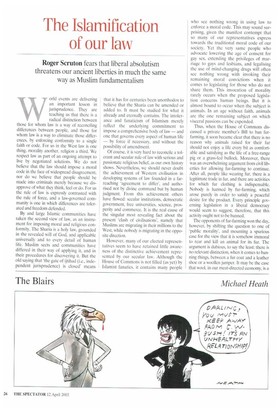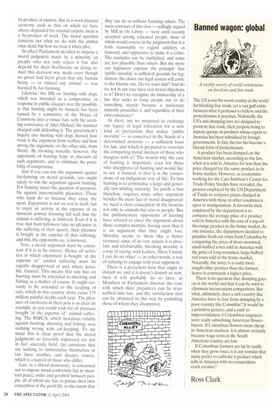The Islamification of our law
Roger Scruton fears that liberal absolutism threatens our ancient liberties in much the same way as Muslim fundamentalism Nvorld events are delivering an important lesson in jurisprudence. They are teaching us that there is a radical distinction between those for whom law is a way of reconciling differences between people, and those for whom law is a way to eliminate those differences, by enforcing conformity to a single faith or code. For us in the West law is one thing, morality another, religion a third. We respect law as part of an ongoing attempt to live by negotiated solutions. We do not believe that the law should impose a moral code in the face of widespread disagreement, nor do we believe that people should be made into criminals merely because we disapprove of what they think, feel or do. For us the rule of law is expressly contrasted with the rule of force, and a law-governed community is one in which differences are tolerated and freedom defended.
By and large Islamic communities have taken the second view of law, as an instrument for imposing moral and religious conformity. The Sharia is a holy law, grounded in the revealed will of God, and applicable universally and to every detail of human life. Muslim sects and communities have differed in their way of applying it, and in their procedures for discovering it. But the old saying that 'the gate of ijtihad (i.e., independent jurisprudence) is closed' means that it has for centuries been unorthodox to believe that the Sharia can be amended or added to. It must be studied for what it already and eternally contains. The intolerance and fanaticism of Islamism merely reflect the underlying commitment to impose a comprehensive body of law — and one that governs every aspect of human life — by force if necessary, and without the possibility of amendment.
Of course, it is very hard to reconcile a tolerant and secular rule of law with serious and passionate religious belief, as our own history shows. Nevertheless, we should never doubt the achievement of Western civilisation in developing systems of law founded in a farreaching 'agreement to differ', and authorised not by divine command but by human judgment. From this achievement others have flowed: secular institutions, democratic government, free universities, science, prosperity and commerce. It is the real cause of the singular most revealing fact about the present 'clash of civilisations', namely that Muslims are migrating in their millions to the West, while nobody is migrating in the opposite direction.
However, many of our elected representatives seem to have retained little awareness of the distinctive achievement represented by our secular law, Although the House of Commons is not filled (as yet) by Islamist fanatics, it contains many people who see nothing wrong in using law to enforce a moral code. This may sound surprising, given the manifest contempt that so many of our representatives express towards the traditional moral code of our society. Yet the very same people who advocate lowering the age of consent for gay sex, extending the privileges of marriage to gays and lesbians, and legalising the use of mind-changing drugs will often see nothing wrong with invoking their remaining moral convictions when it comes to legislating for those who do not share them. This invocation of morality rarely occurs when the proposed legislation concerns human beings. But it is almost bound to occur when the subject is animals. In an age without faith, animals are the one remaining subject on which visceral passions can be expended.
Thus, when the House of Commons discussed a private member's Bill to ban furfarming, it soon became clear that there is no reason why animals raised for their fur should not enjoy a life every bit as comfortable and satisfying as the life of a free-range pig or a grass-fed bullock. Moreover, there was an overwhelming argument from civil liberties for allowing fur-farming to continue. After all, people like wearing fur, there is a legitimate trade in fur, and there are activities for which fur clothing is indispensable. Nobody is harmed by fur-farming, which arose purely in order to satisfy a peaceful desire for the product. Every principle governing legislation in a liberal democracy would seem to suggest, therefore, that this activity ought not to he banned.
The opponents of fur-farming won the day, however, by shifting the question to one of 'public morality', and mounting a spurious case for the view that it is somehow immoral to rear and kill an animal for its fur. The argument is dubious, to say the least: there is no relevant distinction, when it comes to banning things, between a fur coat and a leather shoe or a woollen jumper. It may be the case that wool, in our meat-directed economy, is a
by-product of mutton. But in a wool-directed economy, such as that on which we have always depended for oriental carpets. meat is a by-product of wool. The moral question concerns not what we do with the animal once dead, but how we treat it when alive.
In effect Parliament decided to impose a moral judgment made by a minority on people who not only reject it but also depend for their livelihoods on doing so. And this decision was made even though no proof had been given that any human being — or indeed any animal — was harmed by fur-farming.
Likewise. the Bill on hunting with dogs, which was intended as a compromise, in response to public disquiet over the possibility that hunting might be banned, has been turned by a committee of the House of Commons into a virtual ban, with the seeming connivance of Alun Michael, the minister charged with defending it. The government's inquiry into hunting with dogs showed how weak is the argument from welfare and how strong the argument, on the other side, from liberty. By invoking morality, however, the opponents of hunting hope to discount all such arguments, and to eliminate the possibility of compromise.
And if you can win the argument against fur-farming on moral grounds, you ought surely to win the argument against hunting. For hunting raises the question of permissible against impermissible pleasures. Those who hunt do so because they enjoy the sport. Enjoyment is not an evil in itself, but to enjoy an activity at the expense of an innocent animal, knowing full well that the animal is suffering, is immoral. Even if it is true that hunt followers take no pleasure in the suffering of their quarry, their pleasure is bought at the expense of that suffering, and this, the opponents say, is immoral.
Now, a moral argument must be consistent if it is to be sincere. Hence all activities in which enjoyment is bought 'at the expense of' animal suffering must be equally disapproved of and, where possible, banned. This means that any ban on hunting must be extended to shooting and fishing as a matter of course. It ought certainly to be extended to the keeping of cats, which in this country alone cause 175 million painful deaths each year. The pleasure of cat-lovers in their pets is as clear an example as you could wish for of pleasure bought 'at the expense of' animal suffering. The RSPCA, which moralises volubly against hunting, shooting and fishing, sees nothing wrong with cat-keeping. To my mind this is clear proof that the moral judgments so fervently expressed are not in fact sincerely held; the emotions that arc seeking to immortalise themselves in law have another, and deeper, source, which is a hatred of those who differ.
Law, in a liberal democracy, is concerned not to impose moral conformity but to maintain peace, order and goodwill between people, all of whom are free to pursue their own conception of the good life, to the extent that they can do so without harming others. The main contours of this view — tellingly argued by Mill in On Liberty — were until recently accepted among educated people, most of whom would concur in the judgment that it is both reasonable to regard adultery as immoral, and oppressive to make it a crime. The examples can be multiplied, and some are less plausible than others. But the more our legislators espouse the principle that 'public morality' is sufficient grounds for legislation, the closer our legal system will come to the Islamic one. Do we want that? And do we not in any case have real moral objections to it? Don't we recognise the immorality of a law that seeks to force people not to do something merely because a passionate minority proscribes it, and regardless of their own conscience?
In short, are we prepared to exchange our legacy of legal toleration for a new kind of puritanism that makes 'public morality' — as conceived in the heads of a determined minority — a sufficient basis for law, and which is prepared to override the competing moral instincts of those who disagree with it? The reason why the case of hunting is important, even for those who disapprove of hunting and would like to see it banned, is that it is the cornerstone of an indigenous way of life. To ban hunting is to criminalise a large and generally law-abiding minority. To justify a ban therefore requires some other argument besides the mere fact of moral disapproval: we need a clear conception of the benefits not only to animals but also to people. But the parliamentary opponents of hunting have refused to enter the argument about these complex matters, having seen that it is an argument that they might lose. Morality seems to them like a better resource, since of its very nature it is absolute and irrebuttable. Invoking morality is a way of saying, with Luther, 'Here I stand; I can do no other' — in other words, a way of refusing to engage with your opponent.
There is a precedent here that ought to disturb us; and if it doesn't disturb us now, then it will probably do so later, as Members of Parliament discover the ease with which their prejudices can be transcribed into law, and the satisfaction that can be obtained in this way by punishing those of whom they disapprove.



































































 Previous page
Previous page